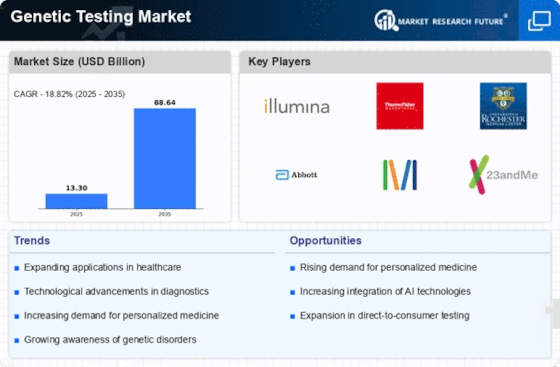Prenatal Testing
Newborn Screening
Carrier Testing
Diagnostic Testing
Predictive Testing
Single Gene Tests
Panel Tests
Whole Exome Sequencing
Whole Genome Sequencing
Non-Invasive Prenatal Testing
Laboratory Services
Diagnostic Services
Consultation Services
Hospitals
Clinical Laboratories
Research Institutions
Homecare Settings
North America
Europe
South America
Asia Pacific
Middle East and Africa
North America Outlook (USD Billion, 2019-2035)
Genetic Testing Market by Application Type
Prenatal Testing
Newborn Screening
Carrier Testing
Diagnostic Testing
Predictive Testing
Genetic Testing Market by Type
Single Gene Tests
Panel Tests
Whole Exome Sequencing
Whole Genome Sequencing
Non-Invasive Prenatal Testing
Genetic Testing Market by Service Type
Laboratory Services
Diagnostic Services
Consultation Services
Genetic Testing Market by End User Type
Hospitals
Clinical Laboratories
Research Institutions
Homecare Settings
Genetic Testing Market by Regional Type
US
Canada
US Outlook (USD Billion, 2019-2035)
Genetic Testing Market by Application Type
Prenatal Testing
Newborn Screening
Carrier Testing
Diagnostic Testing
Predictive Testing
Genetic Testing Market by Type
Single Gene Tests
Panel Tests
Whole Exome Sequencing
Whole Genome Sequencing
Non-Invasive Prenatal Testing
Genetic Testing Market by Service Type
Laboratory Services
Diagnostic Services
Consultation Services
Genetic Testing Market by End User Type
Hospitals
Clinical Laboratories
Research Institutions
Homecare Settings
CANADA Outlook (USD Billion, 2019-2035)
Genetic Testing Market by Application Type
Prenatal Testing
Newborn Screening
Carrier Testing
Diagnostic Testing
Predictive Testing
Genetic Testing Market by Type
Single Gene Tests
Panel Tests
Whole Exome Sequencing
Whole Genome Sequencing
Non-Invasive Prenatal Testing
Genetic Testing Market by Service Type
Laboratory Services
Diagnostic Services
Consultation Services
Genetic Testing Market by End User Type
Hospitals
Clinical Laboratories
Research Institutions
Homecare Settings
Europe Outlook (USD Billion, 2019-2035)
Genetic Testing Market by Application Type
Prenatal Testing
Newborn Screening
Carrier Testing
Diagnostic Testing
Predictive Testing
Genetic Testing Market by Type
Single Gene Tests
Panel Tests
Whole Exome Sequencing
Whole Genome Sequencing
Non-Invasive Prenatal Testing
Genetic Testing Market by Service Type
Laboratory Services
Diagnostic Services
Consultation Services
Genetic Testing Market by End User Type
Hospitals
Clinical Laboratories
Research Institutions
Homecare Settings
Genetic Testing Market by Regional Type
Germany
UK
France
Russia
Italy
Spain
Rest of Europe
GERMANY Outlook (USD Billion, 2019-2035)
Genetic Testing Market by Application Type
Prenatal Testing
Newborn Screening
Carrier Testing
Diagnostic Testing
Predictive Testing
Genetic Testing Market by Type
Single Gene Tests
Panel Tests
Whole Exome Sequencing
Whole Genome Sequencing
Non-Invasive Prenatal Testing
Genetic Testing Market by Service Type
Laboratory Services
Diagnostic Services
Consultation Services
Genetic Testing Market by End User Type
Hospitals
Clinical Laboratories
Research Institutions
Homecare Settings
UK Outlook (USD Billion, 2019-2035)
Genetic Testing Market by Application Type
Prenatal Testing
Newborn Screening
Carrier Testing
Diagnostic Testing
Predictive Testing
Genetic Testing Market by Type
Single Gene Tests
Panel Tests
Whole Exome Sequencing
Whole Genome Sequencing
Non-Invasive Prenatal Testing
Genetic Testing Market by Service Type
Laboratory Services
Diagnostic Services
Consultation Services
Genetic Testing Market by End User Type
Hospitals
Clinical Laboratories
Research Institutions
Homecare Settings
FRANCE Outlook (USD Billion, 2019-2035)
Genetic Testing Market by Application Type
Prenatal Testing
Newborn Screening
Carrier Testing
Diagnostic Testing
Predictive Testing
Genetic Testing Market by Type
Single Gene Tests
Panel Tests
Whole Exome Sequencing
Whole Genome Sequencing
Non-Invasive Prenatal Testing
Genetic Testing Market by Service Type
Laboratory Services
Diagnostic Services
Consultation Services
Genetic Testing Market by End User Type
Hospitals
Clinical Laboratories
Research Institutions
Homecare Settings
RUSSIA Outlook (USD Billion, 2019-2035)
Genetic Testing Market by Application Type
Prenatal Testing
Newborn Screening
Carrier Testing
Diagnostic Testing
Predictive Testing
Genetic Testing Market by Type
Single Gene Tests
Panel Tests
Whole Exome Sequencing
Whole Genome Sequencing
Non-Invasive Prenatal Testing
Genetic Testing Market by Service Type
Laboratory Services
Diagnostic Services
Consultation Services
Genetic Testing Market by End User Type
Hospitals
Clinical Laboratories
Research Institutions
Homecare Settings
ITALY Outlook (USD Billion, 2019-2035)
Genetic Testing Market by Application Type
Prenatal Testing
Newborn Screening
Carrier Testing
Diagnostic Testing
Predictive Testing
Genetic Testing Market by Type
Single Gene Tests
Panel Tests
Whole Exome Sequencing
Whole Genome Sequencing
Non-Invasive Prenatal Testing
Genetic Testing Market by Service Type
Laboratory Services
Diagnostic Services
Consultation Services
Genetic Testing Market by End User Type
Hospitals
Clinical Laboratories
Research Institutions
Homecare Settings
SPAIN Outlook (USD Billion, 2019-2035)
Genetic Testing Market by Application Type
Prenatal Testing
Newborn Screening
Carrier Testing
Diagnostic Testing
Predictive Testing
Genetic Testing Market by Type
Single Gene Tests
Panel Tests
Whole Exome Sequencing
Whole Genome Sequencing
Non-Invasive Prenatal Testing
Genetic Testing Market by Service Type
Laboratory Services
Diagnostic Services
Consultation Services
Genetic Testing Market by End User Type
Hospitals
Clinical Laboratories
Research Institutions
Homecare Settings
REST OF EUROPE Outlook (USD Billion, 2019-2035)
Genetic Testing Market by Application Type
Prenatal Testing
Newborn Screening
Carrier Testing
Diagnostic Testing
Predictive Testing
Genetic Testing Market by Type
Single Gene Tests
Panel Tests
Whole Exome Sequencing
Whole Genome Sequencing
Non-Invasive Prenatal Testing
Genetic Testing Market by Service Type
Laboratory Services
Diagnostic Services
Consultation Services
Genetic Testing Market by End User Type
Hospitals
Clinical Laboratories
Research Institutions
Homecare Settings
APAC Outlook (USD Billion, 2019-2035)
Genetic Testing Market by Application Type
Prenatal Testing
Newborn Screening
Carrier Testing
Diagnostic Testing
Predictive Testing
Genetic Testing Market by Type
Single Gene Tests
Panel Tests
Whole Exome Sequencing
Whole Genome Sequencing
Non-Invasive Prenatal Testing
Genetic Testing Market by Service Type
Laboratory Services
Diagnostic Services
Consultation Services
Genetic Testing Market by End User Type
Hospitals
Clinical Laboratories
Research Institutions
Homecare Settings
Genetic Testing Market by Regional Type
China
India
Japan
South Korea
Malaysia
Thailand
Indonesia
Rest of APAC
CHINA Outlook (USD Billion, 2019-2035)
Genetic Testing Market by Application Type
Prenatal Testing
Newborn Screening
Carrier Testing
Diagnostic Testing
Predictive Testing
Genetic Testing Market by Type
Single Gene Tests
Panel Tests
Whole Exome Sequencing
Whole Genome Sequencing
Non-Invasive Prenatal Testing
Genetic Testing Market by Service Type
Laboratory Services
Diagnostic Services
Consultation Services
Genetic Testing Market by End User Type
Hospitals
Clinical Laboratories
Research Institutions
Homecare Settings
INDIA Outlook (USD Billion, 2019-2035)
Genetic Testing Market by Application Type
Prenatal Testing
Newborn Screening
Carrier Testing
Diagnostic Testing
Predictive Testing
Genetic Testing Market by Type
Single Gene Tests
Panel Tests
Whole Exome Sequencing
Whole Genome Sequencing
Non-Invasive Prenatal Testing
Genetic Testing Market by Service Type
Laboratory Services
Diagnostic Services
Consultation Services
Genetic Testing Market by End User Type
Hospitals
Clinical Laboratories
Research Institutions
Homecare Settings
JAPAN Outlook (USD Billion, 2019-2035)
Genetic Testing Market by Application Type
Prenatal Testing
Newborn Screening
Carrier Testing
Diagnostic Testing
Predictive Testing
Genetic Testing Market by Type
Single Gene Tests
Panel Tests
Whole Exome Sequencing
Whole Genome Sequencing
Non-Invasive Prenatal Testing
Genetic Testing Market by Service Type
Laboratory Services
Diagnostic Services
Consultation Services
Genetic Testing Market by End User Type
Hospitals
Clinical Laboratories
Research Institutions
Homecare Settings
SOUTH KOREA Outlook (USD Billion, 2019-2035)
Genetic Testing Market by Application Type
Prenatal Testing
Newborn Screening
Carrier Testing
Diagnostic Testing
Predictive Testing
Genetic Testing Market by Type
Single Gene Tests
Panel Tests
Whole Exome Sequencing
Whole Genome Sequencing
Non-Invasive Prenatal Testing
Genetic Testing Market by Service Type
Laboratory Services
Diagnostic Services
Consultation Services
Genetic Testing Market by End User Type
Hospitals
Clinical Laboratories
Research Institutions
Homecare Settings
MALAYSIA Outlook (USD Billion, 2019-2035)
Genetic Testing Market by Application Type
Prenatal Testing
Newborn Screening
Carrier Testing
Diagnostic Testing
Predictive Testing
Genetic Testing Market by Type
Single Gene Tests
Panel Tests
Whole Exome Sequencing
Whole Genome Sequencing
Non-Invasive Prenatal Testing
Genetic Testing Market by Service Type
Laboratory Services
Diagnostic Services
Consultation Services
Genetic Testing Market by End User Type
Hospitals
Clinical Laboratories
Research Institutions
Homecare Settings
THAILAND Outlook (USD Billion, 2019-2035)
Genetic Testing Market by Application Type
Prenatal Testing
Newborn Screening
Carrier Testing
Diagnostic Testing
Predictive Testing
Genetic Testing Market by Type
Single Gene Tests
Panel Tests
Whole Exome Sequencing
Whole Genome Sequencing
Non-Invasive Prenatal Testing
Genetic Testing Market by Service Type
Laboratory Services
Diagnostic Services
Consultation Services
Genetic Testing Market by End User Type
Hospitals
Clinical Laboratories
Research Institutions
Homecare Settings
INDONESIA Outlook (USD Billion, 2019-2035)
Genetic Testing Market by Application Type
Prenatal Testing
Newborn Screening
Carrier Testing
Diagnostic Testing
Predictive Testing
Genetic Testing Market by Type
Single Gene Tests
Panel Tests
Whole Exome Sequencing
Whole Genome Sequencing
Non-Invasive Prenatal Testing
Genetic Testing Market by Service Type
Laboratory Services
Diagnostic Services
Consultation Services
Genetic Testing Market by End User Type
Hospitals
Clinical Laboratories
Research Institutions
Homecare Settings
REST OF APAC Outlook (USD Billion, 2019-2035)
Genetic Testing Market by Application Type
Prenatal Testing
Newborn Screening
Carrier Testing
Diagnostic Testing
Predictive Testing
Genetic Testing Market by Type
Single Gene Tests
Panel Tests
Whole Exome Sequencing
Whole Genome Sequencing
Non-Invasive Prenatal Testing
Genetic Testing Market by Service Type
Laboratory Services
Diagnostic Services
Consultation Services
Genetic Testing Market by End User Type
Hospitals
Clinical Laboratories
Research Institutions
Homecare Settings
South America Outlook (USD Billion, 2019-2035)
Genetic Testing Market by Application Type
Prenatal Testing
Newborn Screening
Carrier Testing
Diagnostic Testing
Predictive Testing
Genetic Testing Market by Type
Single Gene Tests
Panel Tests
Whole Exome Sequencing
Whole Genome Sequencing
Non-Invasive Prenatal Testing
Genetic Testing Market by Service Type
Laboratory Services
Diagnostic Services
Consultation Services
Genetic Testing Market by End User Type
Hospitals
Clinical Laboratories
Research Institutions
Homecare Settings
Genetic Testing Market by Regional Type
Brazil
Mexico
Argentina
Rest of South America
BRAZIL Outlook (USD Billion, 2019-2035)
Genetic Testing Market by Application Type
Prenatal Testing
Newborn Screening
Carrier Testing
Diagnostic Testing
Predictive Testing
Genetic Testing Market by Type
Single Gene Tests
Panel Tests
Whole Exome Sequencing
Whole Genome Sequencing
Non-Invasive Prenatal Testing
Genetic Testing Market by Service Type
Laboratory Services
Diagnostic Services
Consultation Services
Genetic Testing Market by End User Type
Hospitals
Clinical Laboratories
Research Institutions
Homecare Settings
MEXICO Outlook (USD Billion, 2019-2035)
Genetic Testing Market by Application Type
Prenatal Testing
Newborn Screening
Carrier Testing
Diagnostic Testing
Predictive Testing
Genetic Testing Market by Type
Single Gene Tests
Panel Tests
Whole Exome Sequencing
Whole Genome Sequencing
Non-Invasive Prenatal Testing
Genetic Testing Market by Service Type
Laboratory Services
Diagnostic Services
Consultation Services
Genetic Testing Market by End User Type
Hospitals
Clinical Laboratories
Research Institutions
Homecare Settings
ARGENTINA Outlook (USD Billion, 2019-2035)
Genetic Testing Market by Application Type
Prenatal Testing
Newborn Screening
Carrier Testing
Diagnostic Testing
Predictive Testing
Genetic Testing Market by Type
Single Gene Tests
Panel Tests
Whole Exome Sequencing
Whole Genome Sequencing
Non-Invasive Prenatal Testing
Genetic Testing Market by Service Type
Laboratory Services
Diagnostic Services
Consultation Services
Genetic Testing Market by End User Type
Hospitals
Clinical Laboratories
Research Institutions
Homecare Settings
REST OF SOUTH AMERICA Outlook (USD Billion, 2019-2035)
Genetic Testing Market by Application Type
Prenatal Testing
Newborn Screening
Carrier Testing
Diagnostic Testing
Predictive Testing
Genetic Testing Market by Type
Single Gene Tests
Panel Tests
Whole Exome Sequencing
Whole Genome Sequencing
Non-Invasive Prenatal Testing
Genetic Testing Market by Service Type
Laboratory Services
Diagnostic Services
Consultation Services
Genetic Testing Market by End User Type
Hospitals
Clinical Laboratories
Research Institutions
Homecare Settings
MEA Outlook (USD Billion, 2019-2035)
Genetic Testing Market by Application Type
Prenatal Testing
Newborn Screening
Carrier Testing
Diagnostic Testing
Predictive Testing
Genetic Testing Market by Type
Single Gene Tests
Panel Tests
Whole Exome Sequencing
Whole Genome Sequencing
Non-Invasive Prenatal Testing
Genetic Testing Market by Service Type
Laboratory Services
Diagnostic Services
Consultation Services
Genetic Testing Market by End User Type
Hospitals
Clinical Laboratories
Research Institutions
Homecare Settings
Genetic Testing Market by Regional Type
GCC Countries
South Africa
Rest of MEA
GCC COUNTRIES Outlook (USD Billion, 2019-2035)
Genetic Testing Market by Application Type
Prenatal Testing
Newborn Screening
Carrier Testing
Diagnostic Testing
Predictive Testing
Genetic Testing Market by Type
Single Gene Tests
Panel Tests
Whole Exome Sequencing
Whole Genome Sequencing
Non-Invasive Prenatal Testing
Genetic Testing Market by Service Type
Laboratory Services
Diagnostic Services
Consultation Services
Genetic Testing Market by End User Type
Hospitals
Clinical Laboratories
Research Institutions
Homecare Settings
SOUTH AFRICA Outlook (USD Billion, 2019-2035)
Genetic Testing Market by Application Type
Prenatal Testing
Newborn Screening
Carrier Testing
Diagnostic Testing
Predictive Testing
Genetic Testing Market by Type
Single Gene Tests
Panel Tests
Whole Exome Sequencing
Whole Genome Sequencing
Non-Invasive Prenatal Testing
Genetic Testing Market by Service Type
Laboratory Services
Diagnostic Services
Consultation Services
Genetic Testing Market by End User Type
Hospitals
Clinical Laboratories
Research Institutions
Homecare Settings
REST OF MEA Outlook (USD Billion, 2019-2035)
Genetic Testing Market by Application Type
Prenatal Testing
Newborn Screening
Carrier Testing
Diagnostic Testing
Predictive Testing
Genetic Testing Market by Type
Single Gene Tests
Panel Tests
Whole Exome Sequencing
Whole Genome Sequencing
Non-Invasive Prenatal Testing
Genetic Testing Market by Service Type
Laboratory Services
Diagnostic Services
Consultation Services
Genetic Testing Market by End User Type
Hospitals
Clinical Laboratories
Research Institutions
Homecare Settings



















Leave a Comment